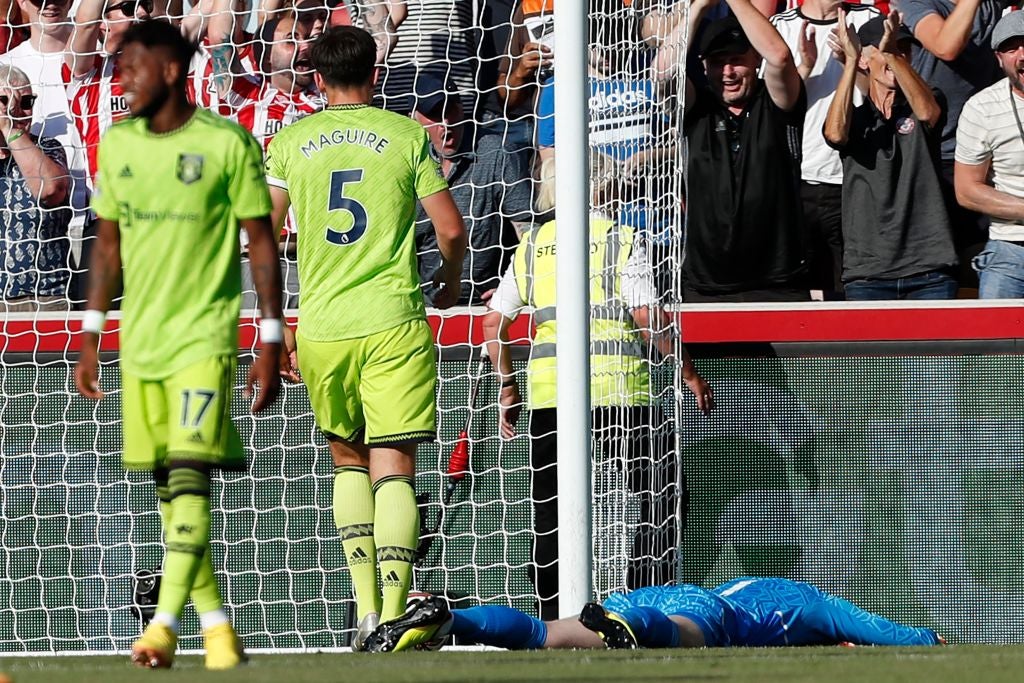
David de Gea picked out the playmaker. He had the ball at his feet in the penalty area and slid a forward pass to Manchester United’s new regista. It was Erik ten Hag’s vision being put into practice. It was a sign that an old dog could learn new tricks.
Or not. The pass was telegraphed, with Mathias Jensen snapping at Christian Eriksen’s heels. And while one Dane received the ball, he was soon dispossessed by another. Jensen duly dispatched a shot past De Gea. Brentford 2 Manchester United 0, and it still wasn’t the Spaniard’s worst error of the first 18 minutes.
De Gea reflected afterwards that his major mistake was in decision-making, in passing to Eriksen when he should have gone long. If it was a player over-compensating in a bid to show he is embracing a new ethos, he actually underlined doubts that he is suited to it.
“I am convinced he can do it,” said Ten Hag, but others could be forgiven for not sharing his confidence. The revolution has got off to a false start and not just because De Gea completed 17.0 passes per game last season and 17.5 now at a similar accuracy rate.
In public, if not necessarily in private, Ten Hag has shown faith. But faith and evidence are very different concepts and if the numbers were compiled under previous managers when passing was often less of a priority, they paint a picture of a goalkeeper who is uncomfortable with the ball at his feet.
De Gea looks like Old Trafford’s youngest anachronism, appearing a man out of time when a different breed of keeper emerged and he was still in his twenties.
One of the most relevant comparisons is found across Manchester, in Ederson, the best footballing goalkeeper in the Premier League. The other will be in the opposite goal at Old Trafford on Monday, in Liverpool’s Alisson. They offer the kind of quality on the ball Ten Hag must want.
Among Premier League regulars, and according to football statistics website Fbref, Ederson ranked 20th for pass completion, at 89.6 per cent last season; understandably, that put him first among goalkeepers, with Alisson (46th at 86.6 per cent) next and De Gea, 236th at 70.6 per cent, ninth among goalkeepers and fifth among those with “big six” clubs, ahead of only Aaron Ramsdale.
It shows a decline from De Gea. In 2019/20, for instance, he completed 77.7 per cent of passes, putting him fifth among goalkeepers who played regularly. However, in 2018/19, his figure of 65.2 per cent was 20 percentage points down on Ederson. It still put De Gea in the top half of the Premier League, but made him look like part of the old guard.
It is not just the accuracy of his passing that is revealing, but the quantity. De Gea is far less accustomed to being involved in moves, far more used to being the 11th outfield player. Alisson completed 1,178 passes in last season’s Premier League, Ederson 976 and De Gea just 646.
If the two Brazilians build from the back more, they are also better at starting attacks with excellent distribution over distance: De Gea’s completion rate for long passes over the last few seasons has always been around 50 per cent, whereas Ederson’s was 72.2 last season and Alisson’s 66.3. They can instigate quick counter-attacks.

Perhaps scarred by his early blunder, United only gave De Gea the ball nine times against Brentford. He completed just 13 passes, his fourth-lowest total in a league game in 2022. In general, he is a spectator far more than Alisson and Ederson, which reflects on the choices made by teammates and managers alike. His colleagues look for him far less: he received 377 passes last season to Ederson’s 717 and Alisson’s 829.
It is partly a question of positioning. Goalkeepers who are rooted to their lines are less involved in the build-up. De Gea had one touch of the ball in the middle third of the pitch last season, Ederson 12, Alisson 15. And if, in reality, neither Brazilian spent much time 35 yards from his own goal, each is an outlet when 15 or 20 yards off his line.
And if Alisson became the goalscoring goalkeeper in improbable fashion against West Bromwich Albion in 2021, he actually has a frequent, if indirect, attacking influence.
Understat’s xGChain statistics for last season – the total expected goals of each spell of possession a player is involved in – showed Ederson (9.95) and Alisson (9.49) with numbers only bettered by three United players. De Gea, at just 3.35, did not offer anything like the same capacity to create chances. In the small sample size of two games under Ten Hag, his xGChain per 90 minutes is the same – 0.09 – as it was last season.
Although, of course, he has made a goal. For Brentford.
Stats via Fbref and Understat







